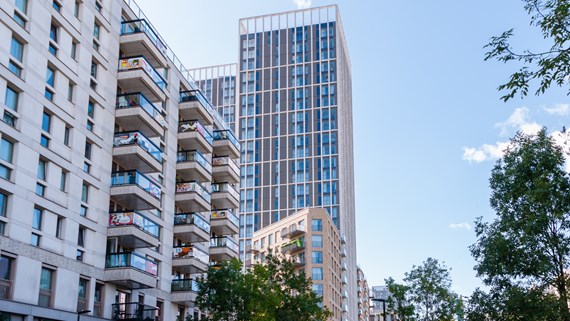Olympic Village Decision: a comfort to leaseholders but a threat to overseas investment?
Insight

Until now, we have been “waiting and seeing” how the regulations under the Building Safety Act 2022 (The Act) will be interpreted and applied by the courts. The implementation of the new legislation itself has taken some time, unfolding in stages. But finally, some clarity seems to be emerging, marked by the issue of the first Remediation Contribution Order in Triathlon Homes LLP v (1) Stratford Village Development Partnership (2) Get Living plc (3) East Village Management Limited [2024] UKFTT 26 (PC). The decision, becoming known by the catchier title of Olympic Village, requires the original developer of the site, and its (wealthy) parent company, to contribute an eyewatering £18 million towards the cost of major remediation works (and associated costs). Interestingly, the order was issued despite the change in the developer's beneficial ownership since the construction of the buildings.
Remediation Contribution Order
The Remediation Contribution Order (RCO) was introduced by section 124 of the Act. It is intended to be a no-fault standalone remedy, meaning that a party ordered to pay under an RCO may not necessarily be the party at fault. The Tribunal in Olympic Village commented that this is a route to securing funding of remedial works without the applicant having to become involved in potentially complex and expensive litigation in respect of the original contractual obligations. When making an order the Tribunal applied the “hierarchy of liability” set out in the Act whereby the developer sits at the top (above freehold owners and any subsequent landlord / s).
It is significant (and perhaps concerning) because it stands to target a wide range of individuals / entities connected with a building requiring (often expensive) remedial works. An RCO can require the current landlord, the former landlord, the developer or a party associated with any of them, to contribute to costs incurred in remedying “relevant” defects. The Act enables the First-Tier Tribunal to grant such an order in relation to a relevant building (as defined by the Act) if it is “just and equitable to do so”.
Background
Olympic Village concerned five residential buildings originally developed by the Stratford Villa Development Partnership (SVDP) to accommodate those participating in / assisting with the London 2012 Olympic Games. The freehold of the buildings remains owned on trust for SVDP, although the beneficial owners have changed. A headlease to a management company (EVML) is in place, under which it has responsibility to repair and maintain the structure and common parts. There are various underleases in place to both Get Living (also SVDP’s parent company) and Triathlon Homes (affordable housing providers). The underleases provide for the underlessees to pay a service charge to EVML.
After the Grenfell Tower fire in 2017, serious fire safety defects were discovered in the residential buildings, relating to both the design and construction of the cladding systems. A waking watch and other temporary measures were implemented and remedial works are ongoing. Some of the costs associated with the waking watch and investigatory work were demanded from the tenants via the service charge, however, the costs of the major works were not. Instead, the management company, EVML secured circa £24.5 million of funding for those works from the Building Safety Fund.
Triathlon, the holder of one of the underleases, sought from the original developer, SVDP and Get Living (as SVDP’s parent company), the costs Triathlon had incurred via the service charge regime as well as payment of Triathlon’s share of the major works. Even though the cost of the major works could not be recovered from Triathlon as an underlessee via the service charge (and were to be paid by the Building Safety Fund), Triathlon still brought this application, explaining that it was concerned that funding for the works via the Building Safety Fund was not necessarily guaranteed, and it wanted to safeguard against any shortfall.
Decision
The FTT granted the RCO, compelling SVDP and Get Living to pay EVML the total sum of around £18 million towards the remediation works, professional fees, other remedial measures and additional costs. It is difficult to pinpoint just what carried weight when determining whether it was “just and equitable” to make the order. Culpability does not seem a key factor. Instead, the Tribunal considered the purpose of the Act and “all relevant factors” (another helpful phrase). One must also assume that the means of SVDP and Get Living were a key consideration.
Triathlon’s concerns about the quantum of available funding from the Building Safety Fund were not given any weight (the FTT found there was no good reason to believe that the remedial works would be hampered by lack of funds) but this was not a reason to refuse the RCO. The FTT said that it would be difficult to see how it could ever be “just and equitable” for a relevant party who is able to fund the relevant remediation works to claim those works should be funded by the public purse.
Much of the argument in the case concerned the question of whether it was “just and equitable” for the RCO to be made. The FTT noted that it was possible for it to be just and equitable for an RCO to be made even where costs were incurred before the relevant parts of the Act came into force (28 June 2022). While it is possible that a party who is at risk of being subject to an RCO could argue, regarding costs incurred before 28 June 2022, that they had acted to their irretrievable prejudice in the belief that they could safely spend the relevant funds given that service charges had been validly demanded and received. That was not the case here.
Practical implications
Management company EVML will now recover circa £18 million from the original developer, SVDP and Get Living, as its parent company. EVML will, one would assume, be liable to reimburse the Building Safety Fund and may look to pursue a claim against the original contractor.
In terms of wider applications:
- Cases will be fact-specific and what is “just and equitable” will differ from case to case (and is likely to be a large focus of the arguments made at the FTT) but this does give a valuable insight as to the approach taken.
- RCOs may be made even when the beneficial owners of the original developer had changed since the building was constructed, meaning that entities may still be liable for remediation costs, even where they did not have any involvement with the building at the time it was redeveloped or where funding has been secured from the Building Safety Fund.
- Anyone contemplating the share purchase of a real estate company will now be well advised to carry out due diligence on all properties previously developed or owned by that entity, as well as existing ones.
- Payment from the Building Safety Fund is not to be considered the ultimate solution. Payments advanced by the Building Safety Fund should be repaid where they can be recovered from a third party. RCOs can be used as a way of achieving this reimbursement. Given this, it is possible that the Building Safety Fund will expect RCO applications to be made before funds are granted.
Of course, as is ever the case in the shifting landscape presented to us by the Act, things may change. At the time of writing it is known that Get Living has requested permission to appeal, stating that this decision could potentially significantly undermine international investment in UK residential property. It is not known whether permission has been granted, so this remains one to watch.
This publication is a general summary of the law. It should not replace legal advice tailored to your specific circumstances.
© Farrer & Co LLP, February 2024






